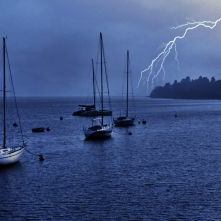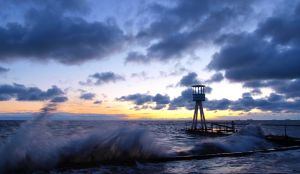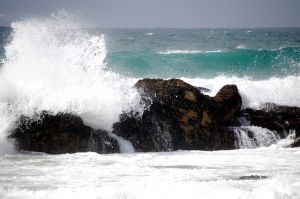Travel News
Hurricane Season 2009 Kicks off with Tropical Storm Andres
 The 2009 hurricane season started with a bang today, as the first named cyclone of the season made its way toward Mexico’s western coast and prompted the government to issue a hurricane watch.
The 2009 hurricane season started with a bang today, as the first named cyclone of the season made its way toward Mexico’s western coast and prompted the government to issue a hurricane watch.
Tropical Storm Andres, which formed on Sunday over the Pacific, is currently located 120 miles southwest of the coastal town of Zihuatanejo.
It is headed in a northwesterly direction toward the tip of Baja California at a speed of about 4 miles per hour.
The storm could develop into a hurricane as soon as tomorrow, according to the U.S. Hurricane Center, but is expected to weaken again before it reaches Cabo San Lucas later this week. Its current sustained winds are about 52 miles per hour. In order for it to become a hurricane, wind speeds must reach at least 73 miles per hour.
Read our previous coverage of the big events from last season: Hurricane Season 2008: Hanna, Ike and Josephine.
Learn more about Hurricane Guarantees and “Hurricane-Free” Islands.
As a precaution, Mexican authorities closed the port at Zihuatanejo and have issued a hurricane watch from Lazaro Cardenas north to Cabo Corrientes.
Surfers are anticipating a few days of excellent swells throughout Baja California, but deep sea anglers may have to hang up their fishing poles for a few days if the storm forces the closure of ports around Cabo San Lucas.
 Hurricane season 2009 is expected to bring between nine to 14 named storms and three major hurricanes between June and November, which weather experts say is about average.
Hurricane season 2009 is expected to bring between nine to 14 named storms and three major hurricanes between June and November, which weather experts say is about average.
Last season there were at least six big storms (including Fay, Ike, Hanna, Josephine, Gustav, and Omar) which caused huge amounts of damage to Texas’ Gulf Coast and many parts of the Caribbean including Haiti, Cuba, the Turks and Caicos, and the Cayman Islands. Most of the storm-drenched areas, which rely heavily on tourism for income, have already rebuilt and bounced back.
If you do plan to take a vacation during hurricane season, it is a good idea to check what kind of credit or refund your resort, airline or cruise line offers to protect you in case you are stranded or have to cancel.
Many hotels and resorts in the Caribbean and on Mexico’s west coast offer hurricane “guarantees,” which give travelers refunds or rain checks should their trips be cut short or cancelled by a hurricane.
 Some airlines will waive change penalties if a hurricane is imminent, and let you rebook your flight within a fixed period of time so you can take your trip at a later date. However, make sure you check the rules and restrictions because the re-booking period is often very short.
Some airlines will waive change penalties if a hurricane is imminent, and let you rebook your flight within a fixed period of time so you can take your trip at a later date. However, make sure you check the rules and restrictions because the re-booking period is often very short.
Cruises can be trickier. If you’re already onboard when a hurricane strikes, the cruise line can change the itinerary to avoid a storm and they are not required to compensate you. However, most will offer some sort of goodwill gesture such as free onboard credit or a discount on a future cruise. If you haven’t boarded yet, you can generally cancel and re-book at a later date without penalty.
The best way to fully protect yourself if you are worried about your trip being ruined by a hurricane is to buy travel insurance that lets you cancel for any reason and also offers trip interruption coverage for weather reasons.
Learn more about Hurricane Guarantees and “Hurricane-Free” Islands.
By Karen Elowitt for PeterGreenberg.com












